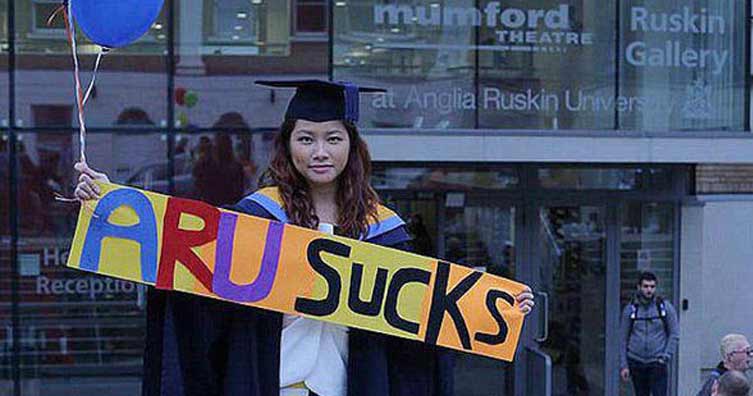Student suing Anglia Ruskin Uni over her ‘Mickey Mouse’ degree
After feeling that she was let down by poor quality teaching, one graduate is taking things into her own hands and demanding a refund...

Credit: Facebook
A graduate is suing her former university for £60,000 because she believes her two-year degree has not helped her career in any way.
Despite graduating with a first, Pok Wong, 29, is suing Anglia Ruskin University over the quality of the education she received.
She told The Sunday Telegraph that claims the university made about “quality education and prospect of employment after graduation” were fraudulent.
Ms Wong moved to the UK from Hong Kong to study at Anglia Ruskin’s Lord Ashcroft International Business School in Cambridge because she was won over by claims made in the institution’s prospectus.
She has lodged complaints with London County Court, alleging that the university failed to deliver on its promises and accusing it of a breach of contract and fraudulent misinterpretation.
Ms Wong's complaints of poor teaching quality include a lecturer turning up late and students being told to “self-study”.
Students need value for money

It is thought Ms Wong’s case could set a precedent for how universities present their courses in marketing materials. Students who spend around £9,000 a year for their education are demanding value for money and now see themselves as more of a customer.
Ms Wong said her chosen degree “does not play a role to help secure a rewarding job with prospects.”
The prospectus had promised her that the course would leave graduates “well equipped” for jobs in the business world following two years of “high quality” teaching.
As well as this, Ms Wong is alleging she was “locked” in a room for trying to speak about the poor quality of her teaching during her graduation.
The prospectus convinced me that the university is really impressive. But, as soon as I started in 2011, I realised there were failings. Although I graduated with a first class degree in 2013, it is a Mickey Mouse degree.
The graduate has justified the £60,000 compensation she is demanding as a refund for the tuition fees of her International Business Strategy course as well as her living costs during her time spent there.
What do Anglia Ruskin say about this?

Credit: JD - Flickr
A spokesperson for Anglia Ruskin University, which is currently ranked 301st out of 350 universities in the Times Higher Education World University Rankings, told The Independent:
We are well aware of the claims made by this former student and we are robustly defending the current litigation.
Despite being awarded a first class degree she attempted to disrupt her own graduation ceremony in 2013 as part of her dispute with the university, an action which would have damaged the experience for many other graduating students.
The spokesperson went on to explain that Ms Wong was asked to leave the stage, and she sat in a room next to it. They say she was free to leave the room whenever she wanted to, and she did get up and leave of her own accord when the ceremony finished.
Ms Wong’s complaints have been through the full Office of the Independent Adjudicator process, and she then made a complaint to the Information Commissioner’s Office, which was rejected after an investigation.
Following this, she launched legal action against the university and has been required to pay the university’s costs at an earlier hearing.
The #ARUProud hashtag has been created on Twitter as current and former students, as well as staff members, come out in support of the institution following Ms Wong's claims.
I teach at @AngliaRuskin & I know the dedication of my colleagues to our students, the quality of their teaching, and the enthusiastic appreciation our students show. We offer HE to many who might otherwise never have access to it. Today I am prouder than ever of where I work.
— Sean Lang (@sf_lang) March 12, 2018
I withdrew from the final year in my previous university and joined @AngliaRuskin. I had to start again from year one and all I can say is that was one of the best decisions of my life. #ARU showed me the real way of studying a degree. #ARUProud
— ّ (@EAlManai) March 12, 2018
A universal problem?

Credit: David Iliff - Flickr
One of Ms Wong’s main motivations for speaking up is to encourage other students to demand value for money and seek compensation if universities do not deliver what they promise.
I hope that bringing this case will set a precedent so that students can get value for money, and if they don’t they get compensated. Anglia Ruskin talked a good talk but then they didn’t deliver.
The complaint is similar to a case in 2016, when a former Oxford University student tried to sue the institution for £1 million after it did not give him the first class degree he wanted.
Faiz Siddiqui’s argument was that “negligently inadequate teaching” was part of the reason he got a 2:1 degree, which he claimed prevented him from getting into a top US law school and therefore stopped him from following his dream of a career as an international commercial lawyer.
The Oxford student lost the case. However, Mr Justice Foskett, who delivered the verdict, did say that because “students are incurring substantial debts to pursue their university education, the quality of the education delivered will undoubtedly come under even greater scrutiny than it did in the past”.
The Advertising Standards Authority has stepped in to say that universities who make claims in their prospectuses must be able to back them up objectively.
Last year, the watchdog made six universities remove claims they had made in marketing materials.
Spotlight on quality

There has been a renewed focus on holding universities to account for the quality of their teaching recently, with ministers set to pilot a new scheme that will rank university degree courses for quality, subject by subject.
Individual courses at different universities will be graded as gold, silver, or bronze by a new tool feeding in official data on teaching quality.
The tool will not go live until 2020, so students will not be able to use the rankings to choose or rate their courses until then. It will be piloted on 50 universities initially.
Universities say the assessment of subjects must be effective. Ministers say the new scheme will leave institutions with “no place to hide”.
This system to rate teaching is part of the government’s efforts to get tougher on universities, which charge almost £30,000 for a three-year degree, and have been criticised for paying their senior managers very high salaries.
This figure could even go up with the introduction of the Teaching Excellence Framework, which will allow universities to set their own tuition fees as long as they meet certain teaching standards. Universities Minister Sam Gyimah said:
Prospective students deserve to know which courses deliver great teaching and great outcomes - and which ones are lagging behind.
In the age of the student, universities will no longer be able to hide if their teaching quality is not up to the world-class standard that we expect.
What do you think? Should students be able to ask for compensation if they think their course wasn't up to scratch? Let us know!








